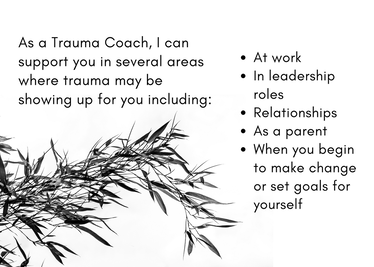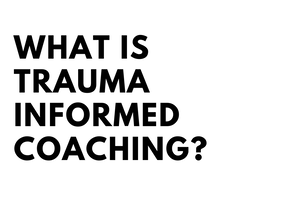Trauma Informed Coaching
Survivor Support: A Guided Path
Survivor Support: A Guided Path
Trauma shapes our lives.
It shapes the way we live, the way we love and the way we make sense of the world.
And it is not your fault.
And you are not your trauma.
Virtually all our afflictions, mental illnesses, physical
diseases stem from trauma.
Trauma distorts our view of reality and leaves us stuck in contraction, defense and reactivity.
It compromises our capacity to be in the moment, to be present to our relationships and to fully take in the environment.
It is at the root of our deepest wounds.
However, there is wisdom in trauma.
The wisdom in trauma comes through when we realize that our traumatic responses and imprints are not us, that we can follow all traumatic responses back to their source, work through them, let them dissipate, and thus reconnect to the unblemished, ecstatic consciousness that we were born with!
It shapes the way we live, the way we love and the way we make sense of the world.
And it is not your fault.
And you are not your trauma.
Virtually all our afflictions, mental illnesses, physical
diseases stem from trauma.
Trauma distorts our view of reality and leaves us stuck in contraction, defense and reactivity.
It compromises our capacity to be in the moment, to be present to our relationships and to fully take in the environment.
It is at the root of our deepest wounds.
However, there is wisdom in trauma.
The wisdom in trauma comes through when we realize that our traumatic responses and imprints are not us, that we can follow all traumatic responses back to their source, work through them, let them dissipate, and thus reconnect to the unblemished, ecstatic consciousness that we were born with!
We have no doubt that we can find a path to support you through a self imposed obstacle that has you stuck.
Trauma Informed Coaching is the practice of understanding the presence of trauma in a coach-client relationship, and how to use it as a guide for resilience and solution-forward resolution. It works the same as regular coaching with the addition of knowledge and tools for what to work on when moral injuries hold back progress.
The depth of information and skill to ‘hold’ this space for deeper coaching work is what gives Trauma Informed Coaching its nuance and strength. Trauma Coaches have training in client regulation, brain-body connection, behavioral reaction, different types of trauma, leading causes, and their subsequent symptoms. They have learned the proper channels for referral and the growing relationship between clinical professionals, therapists, and coaches.
The depth of information and skill to ‘hold’ this space for deeper coaching work is what gives Trauma Informed Coaching its nuance and strength. Trauma Coaches have training in client regulation, brain-body connection, behavioral reaction, different types of trauma, leading causes, and their subsequent symptoms. They have learned the proper channels for referral and the growing relationship between clinical professionals, therapists, and coaches.
Meet Mary McClements.

As a Trauma Coach and previous Victim Advocate, Mary’s authenticity, strong values, and beliefs that are not limiting or suppressing towards working in this area, are some of the characteristics that makes Mary a trusted partner in your trauma work. She has experienced and learned methods to help ‘ground’ the nervous system, discard shame and guilt through powerful questions, and recognize and promote wellness as it starts to develop.
With the growing need for qualified Trauma Informed Coaches in the many different areas that Trauma Recovery Coaching is being used and offered, Mary works to provide drive and guidance to her clients so they may respond to challenges, improve relationships and live a full and rewarding life after trauma. Her focus is on changing negative conditions and creating outcomes that are measurable, generating powerful solutions in a positive environment.
As a Trauma Informed Coach, Mary tends to have a greater awareness for her clients' need for safety. Mary recognizes when her clients are in crisis and needing additional support beyond what she can offer, and she has the resources to refer to them when needed.
Trauma Informed Coaches are also very clear about the boundaries between therapy and coaching. As a Trauma Informed Coach, Mary is non-clinical – she does not treat or diagnose her clients. She has an ethical responsibility to refer her clients to the proper resources when the support they need is outside of the coaching wheelhouse. Mary is able to avoid getting drawn into areas that are not appropriate in a coaching session, and we are clear that we do not treat and we do not diagnose.Mary leaves this to the clinicians. However, Mary can work alongside them to support the client, and in her practice, she partners with 2 clinical psychologists on a needed basis.
Can Trauma Be Coached?
Yes. We have heard some say that trauma can’t be coached. However, with the proper techniques, coaching can work for clients who have experienced trauma. Having more knowledge around trauma and its effects is essential when maneuvering such areas and having a solid coaching education is an absolute necessity. It is the groundwork that compliments the trauma education that follows. With the expertise that comes from the Trauma Informed Coach training, this will be some of the most rewarding work you ever do.
Processing trauma in a coaching environment happens several ways. Values and beliefs take priority. Values and beliefs work is something that as coaches we investigate with all clients, but when working in trauma, it can release and strengthen a client immensely and instantly. Trauma by nature can dislodge a person from their core values, so in working with core values we strengthen their ability to focus on what is important and in which direction to head. Rooting out beliefs that no longer serve our “here and now” is another invaluable method to support trauma clients in building resilience. Shifting old beliefs or stories that no longer serve them, in order to author new stories that fill them with encouragement and possibility, is a practice for healing like no other.
Why Does Mary McClements Focus on Trauma Coaching?
If you are human, you have experienced trauma, whether it was a car accident, the loss of someone you love, childhood trauma that can encompass so much, physical & sexual trauma….the list goes on. In addition to some familial trauma, when Mary's daughter was 11 she was the victim of a sexually exploitative crime, and though at the time, her daughter didn’t understand the potential emotional ramifications, as she got older, what had happened affected her deeply. She and her daughter's world was flipped on their heads and though Mary won’t speak for her daughter's emotions, Mary can tell you that she experienced severe second hand trauma: guilt, anger, isolation, and an inexplicable jumpiness were some of her signs of trauma. It affected Mary's relationships, and it inspired her to become a Victim Advocate and a Trauma Coach after 20 years in education. Mary feels incredibly passionate about helping those who have experienced trauma to move forward with their trauma in a way that may have kept them stuck in the past.
The Trauma you have experienced is not your fault. You deserve to live a life where your past does not affect how you move into the future. You deserve to feel emotional freedom, safety, and contentment.
With the growing need for qualified Trauma Informed Coaches in the many different areas that Trauma Recovery Coaching is being used and offered, Mary works to provide drive and guidance to her clients so they may respond to challenges, improve relationships and live a full and rewarding life after trauma. Her focus is on changing negative conditions and creating outcomes that are measurable, generating powerful solutions in a positive environment.
As a Trauma Informed Coach, Mary tends to have a greater awareness for her clients' need for safety. Mary recognizes when her clients are in crisis and needing additional support beyond what she can offer, and she has the resources to refer to them when needed.
Trauma Informed Coaches are also very clear about the boundaries between therapy and coaching. As a Trauma Informed Coach, Mary is non-clinical – she does not treat or diagnose her clients. She has an ethical responsibility to refer her clients to the proper resources when the support they need is outside of the coaching wheelhouse. Mary is able to avoid getting drawn into areas that are not appropriate in a coaching session, and we are clear that we do not treat and we do not diagnose.Mary leaves this to the clinicians. However, Mary can work alongside them to support the client, and in her practice, she partners with 2 clinical psychologists on a needed basis.
Can Trauma Be Coached?
Yes. We have heard some say that trauma can’t be coached. However, with the proper techniques, coaching can work for clients who have experienced trauma. Having more knowledge around trauma and its effects is essential when maneuvering such areas and having a solid coaching education is an absolute necessity. It is the groundwork that compliments the trauma education that follows. With the expertise that comes from the Trauma Informed Coach training, this will be some of the most rewarding work you ever do.
Processing trauma in a coaching environment happens several ways. Values and beliefs take priority. Values and beliefs work is something that as coaches we investigate with all clients, but when working in trauma, it can release and strengthen a client immensely and instantly. Trauma by nature can dislodge a person from their core values, so in working with core values we strengthen their ability to focus on what is important and in which direction to head. Rooting out beliefs that no longer serve our “here and now” is another invaluable method to support trauma clients in building resilience. Shifting old beliefs or stories that no longer serve them, in order to author new stories that fill them with encouragement and possibility, is a practice for healing like no other.
Why Does Mary McClements Focus on Trauma Coaching?
If you are human, you have experienced trauma, whether it was a car accident, the loss of someone you love, childhood trauma that can encompass so much, physical & sexual trauma….the list goes on. In addition to some familial trauma, when Mary's daughter was 11 she was the victim of a sexually exploitative crime, and though at the time, her daughter didn’t understand the potential emotional ramifications, as she got older, what had happened affected her deeply. She and her daughter's world was flipped on their heads and though Mary won’t speak for her daughter's emotions, Mary can tell you that she experienced severe second hand trauma: guilt, anger, isolation, and an inexplicable jumpiness were some of her signs of trauma. It affected Mary's relationships, and it inspired her to become a Victim Advocate and a Trauma Coach after 20 years in education. Mary feels incredibly passionate about helping those who have experienced trauma to move forward with their trauma in a way that may have kept them stuck in the past.
The Trauma you have experienced is not your fault. You deserve to live a life where your past does not affect how you move into the future. You deserve to feel emotional freedom, safety, and contentment.
Mary can help you with those things!
Based in Chittenden County, VT, Mary offers zoom and phone sessions for clients. When it’s safe to meet in person, her in-person coaching sessions can include walking or sitting based on your preference.

In Trauma Coaching, I focus on very crucial areas that include:
Though everyone has their own unique way of living with and processing their trauma, there are 6 key stages of my coaching that is part of our process:
- Identification - Together we'll discover what is keeping you stuck
- Empowerment - I will help you uncover the tools to empower yourself and solve your own problems and create solutions through understanding yourself.
- Future - We will create the future you want by creating a road map and vision of what you deserve
- Possibilities - We will open the world of your power and ability
- Self-Discovery - We will take a deep dive into who you are, where you want to go and how to get there
- Inner Work - We'll explore the honest inner workings of who you are
- Practices - Through mindset and awareness modalities we'll get you reconnected to yourself
- Time Frame - My aim is not to keep you as a client for life. If that happens, then I have failed at my role as a trauma coach. My mission is to get you out on your own way by living the life that you want as soon as possible. For some Trauma Warriors, this may take a couple of sessions for others a couple of years.
Though everyone has their own unique way of living with and processing their trauma, there are 6 key stages of my coaching that is part of our process:
- Understanding the foundation of trauma and how it impacts you
- Diving deep into who you are
- Challenging yourself and identifying who you want to be
- Creating a plan to cross the gap
- Naming the hidden parts of you and battling your shadow
- Implementing a plan to stay the course

What else will I do as your Trauma Coach?
- Help you explore the vulnerable sides of your wants, needs, and interests
- Give you the ability to clarify what you expect from yourself
- Ask you thought provoking questions to challenge your thought process
- Equip you with the tools to face your fear
- Show you how to remove distractions and focus
- Teach you how to reward yourself
- Support you on your journey to self-discovery through trauma
- Help you identify emotional triggers and how to navigate them
- Take you through self-identifying exercises
- Teach you how to create gratitude despite trauma
- Give you support in setting goals and reaching them
- Discover how to do things that are in your best interest
- Break old patterns and negative self-talk
- Identify problem areas and create plans to disrupt them
- Give you feedback
- Give you a baseline to build on
- Become more confident
- Establish life plans and actionable tasks
- Increase your productivity
- Decipher the impact of trauma on you
- Learn how to be calm in the face of adversity
- Give you the space to be heard
- Teach you how to not give up on yourself despite the trauma
- Teach you accountability for yourself
- Show you how to interrupt self-sabotage
- Release negative thoughts and use them as fuel
- Find solutions in everyday problems
What are the other benefits of having a Trauma Life Coach and Mentor?
|
|
I'm still not sure if I need a Trauma Coach. How else can I know?
|
|
Then be gentle on yourself and reach out...






